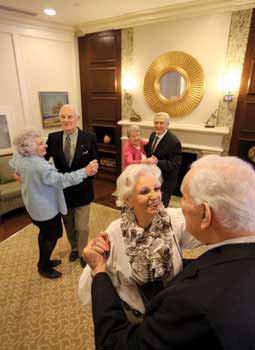The way our memory works and how we store information uses many different areas of the brain at once. If you were to recall what you had for breakfast this morning, the memory of what it looked like would come from one set of brain cells, and what it tasted like, smelled like and how it was prepared would all come from other sets of brain cells.
The more researchers study our brains, and specifically, our memory, the more malleable and interconnected it appears. In 1997, Ellen Carruth found that encouraging residents of long-term care retirement homes to sing helped quell memory loss. Since then, many retirement communities have incorporated music and music therapies into the daily routines of their residents to help keep their minds active.

As a result of their success, doctors and clinics such as the Mayo Clinic are continually developing new programs. The Alzheimer Society of Toronto has recently launched the Music and Memory: iPod Project, which gives individuals diagnosed with dementia or Alzheimer’s a free iPod Shuffle along with iTunes credits. Being reunited with music from the past has helped many patients open up, become more relaxed and, in some cases, sleep better at night (alleviating Sundown Syndrome, for example).
For the past 10 years Dr. Sylvain Moreno has been studying the effects of music on the brain to create processes to help improve people’s memory in later life. “The idea of that is to try to find an access to the brain through music and to train the core skills of the brain, skills that we call executive functions. And we believe that by training these executive function skills, we are able to transfer to all the other skills we use in our daily life,” says Dr. Moreno, who is a cognitive neuroscientist at Baycrest in Toronto. Accessing the brain through music may help seniors because music accesses both left and right hemispheres, creating an interconnection between the parts of your brain that work and the parts that need improvement.
But why should it matter if you can remember what you had for breakfast this morning? The ability to remember and how you remember has a profound affect on your brain. Doctors recommend learning a new instrument, singing, or other musical activities as a great way to keep an active mind, regain executive function skills and stay healthy later in life. Retirement communities across Canada have recognized this and are providing programs that take advantage of music’s healing effect on the brain.



